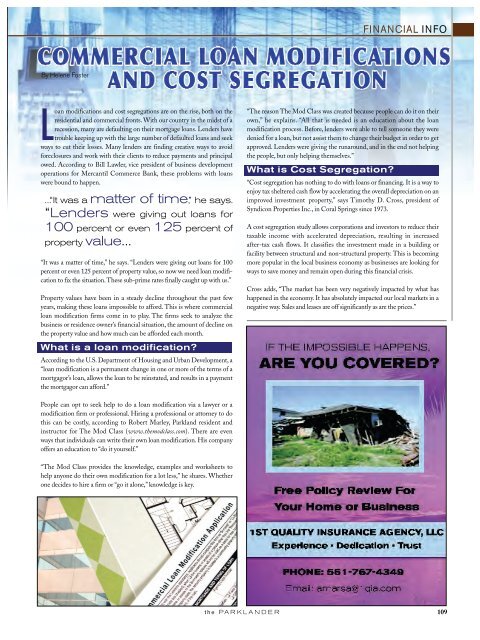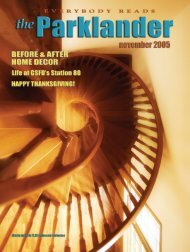celebratingour 2 0 thyear - The Parklander Magazine
celebratingour 2 0 thyear - The Parklander Magazine
celebratingour 2 0 thyear - The Parklander Magazine
- No tags were found...
You also want an ePaper? Increase the reach of your titles
YUMPU automatically turns print PDFs into web optimized ePapers that Google loves.
FINANCIAL INFOBy Helene FosterLoan modifications and cost segregations are on the rise, both on theresidential and commercial fronts. With our country in the midst of arecession, many are defaulting on their mortgage loans. Lenders havetrouble keeping up with the large number of defaulted loans and seekways to cut their losses. Many lenders are finding creative ways to avoidforeclosures and work with their clients to reduce payments and principalowed. According to Bill Lawler, vice president of business developmentoperations for Mercantil Commerce Bank, these problems with loanswere bound to happen....“It was a matter of time,” he says.“Lenders were giving out loans for100 percent or even 125 percent ofproperty value...“It was a matter of time,” he says. “Lenders were giving out loans for 100percent or even 125 percent of property value, so now we need loan modificationto fix the situation.<strong>The</strong>se sub-prime rates finally caught up with us.”Property values have been in a steady decline throughout the past fewyears, making these loans impossible to afford. This is where commercialloan modification firms come in to play. <strong>The</strong> firms seek to analyze thebusiness or residence owner’s financial situation, the amount of decline onthe property value and how much can be afforded each month.What is a loan modification?According to the U.S. Department of Housing and Urban Development, a“loan modification is a permanent change in one or more of the terms of amortgagor’s loan, allows the loan to be reinstated, and results in a paymentthe mortgagor can afford.”“<strong>The</strong> reason <strong>The</strong> Mod Class was created because people can do it on theirown,” he explains. “All that is needed is an education about the loanmodification process. Before, lenders were able to tell someone they weredenied for a loan, but not assist them to change their budget in order to getapproved. Lenders were giving the runaround, and in the end not helpingthe people, but only helping themselves.”What is Cost Segregation?“Cost segregation has nothing to do with loans or financing. It is a way toenjoy tax sheltered cash flow by accelerating the overall depreciation on animproved investment property,” says Timothy D. Cross, president ofSyndicon Properties Inc., in Coral Springs since 1973.A cost segregation study allows corporations and investors to reduce theirtaxable income with accelerated depreciation, resulting in increasedafter-tax cash flows. It classifies the investment made in a building orfacility between structural and non-structural property. This is becomingmore popular in the local business economy as businesses are looking forways to save money and remain open during this financial crisis.Cross adds, “<strong>The</strong> market has been very negatively impacted by what hashappened in the economy. It has absolutely impacted our local markets in anegative way. Sales and leases are off significantly as are the prices.”People can opt to seek help to do a loan modification via a lawyer or amodification firm or professional. Hiring a professional or attorney to dothis can be costly, according to Robert Marley, Parkland resident andinstructor for <strong>The</strong> Mod Class (www.themodclass.com). <strong>The</strong>re are evenways that individuals can write their own loan modification. His companyoffers an education to “do it yourself.”“<strong>The</strong> Mod Class provides the knowledge, examples and worksheets tohelp anyone do their own modification for a lot less,” he shares. Whetherone decides to hire a firm or “go it alone,” knowledge is key.the PARKLANDER109
















